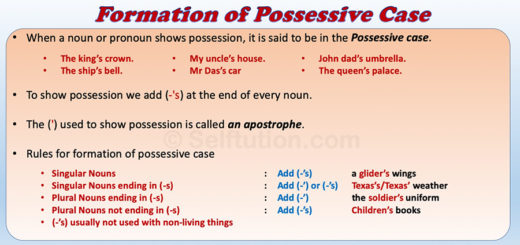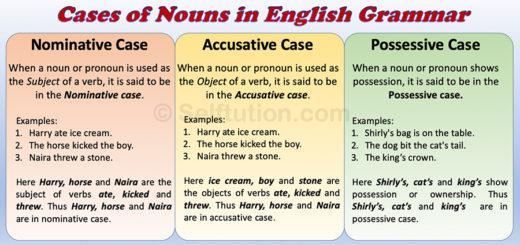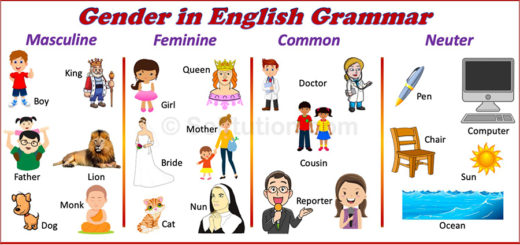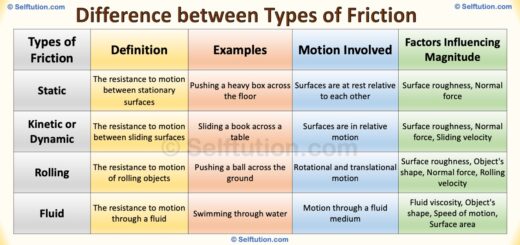Rules of Singular and Plural Nouns with Examples
There are different ways to classify nouns, and one of them is by numbers. So, based on numbers, we classify nouns as singular and plural. A noun is singular if it refers to one person or thing, and it is plural if it refers to more than one person or thing. In this post, we will learn about various rules applied for changing singular nouns to plural, along with examples.
There are various rules for changing singular nouns to plural. However, in this post, we will discuss the 15 most commonly used ones for changing singular nouns to plural.
Rules of Singular and Plural Nouns
Rule 1: Addition of ‘s’
We can change most of the nouns from singular to plural, simply by adding ‘s’ at end of the word.
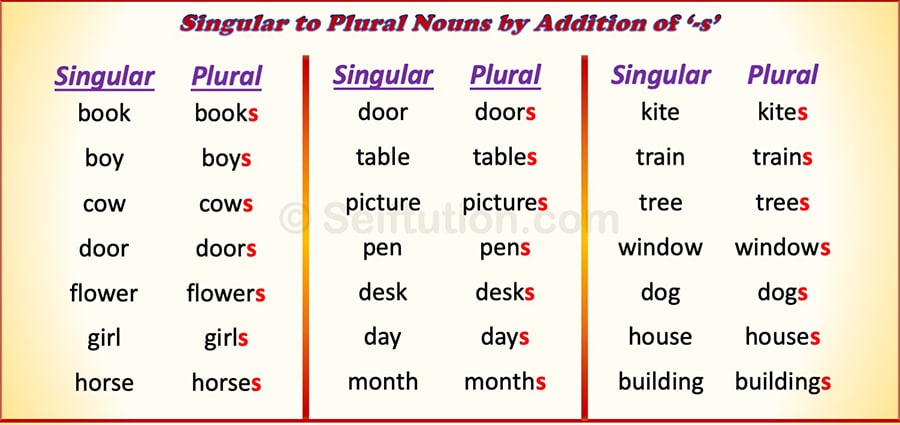
Rules and Examples for Singular to Plural Nouns by Addition of ‘s’
Rule 2: Addition of ‘es’ to the Nouns Ending with a Hissing Sound
To change singular nouns ending with hissing sounds (–s, –ss, –sh, –ch, and -x) to plural we add ‘es’ at the end of the noun.
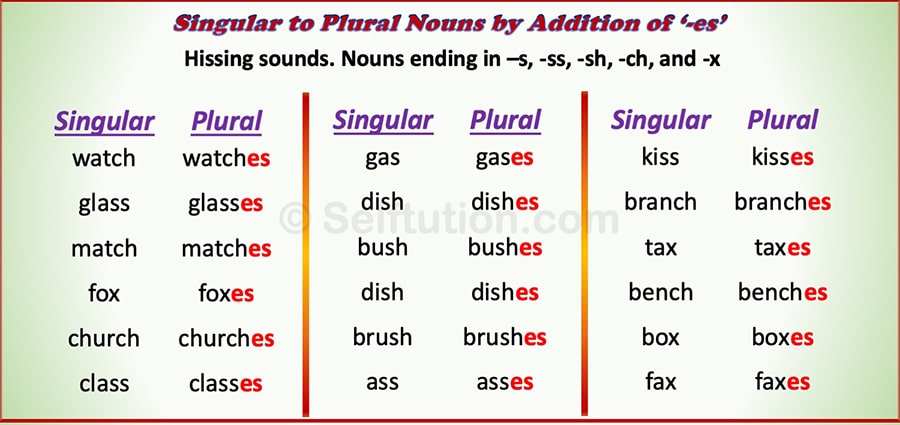
Rules and Examples for changing singular to plural nouns by adding ‘es’
Rule 3: Addition of ‘s’ or ‘es’ to Nouns Ending with ‘o’
Rule 3 is the special case of rules 1 and 2, which explains how to change some singular nouns ending with ‘o’ to plural by adding either ‘s’ or ‘es’.
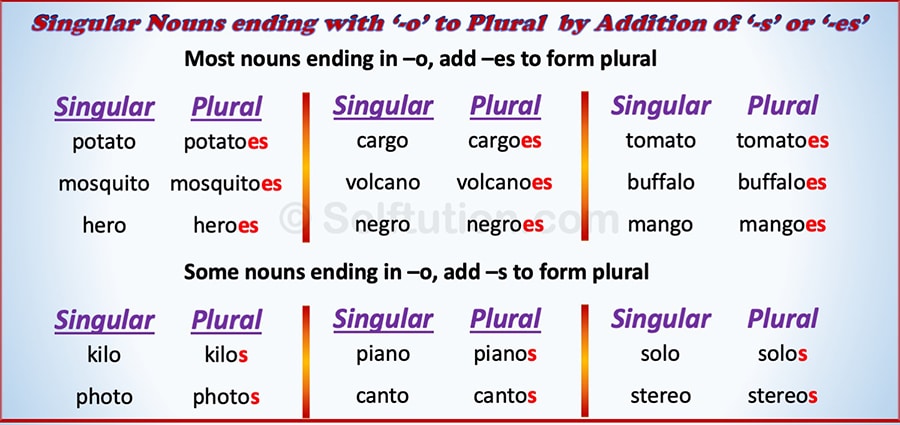
Examples of changing singular nouns ending with ‘-o’ to plural by adding either ‘-s’ or ‘-es’
Rule 4: Addition of ‘s’ to the Main Noun in the Compound Nouns
Some of the nouns are a combination of more than one word, these are called compound nouns. Therefore, to form the plural of such singular nouns, we add ‘s’ at the end of the main word. But this rule is not applicable to all compound nouns. Some singular nouns in compound nouns follow their respective rules to change them to plural.
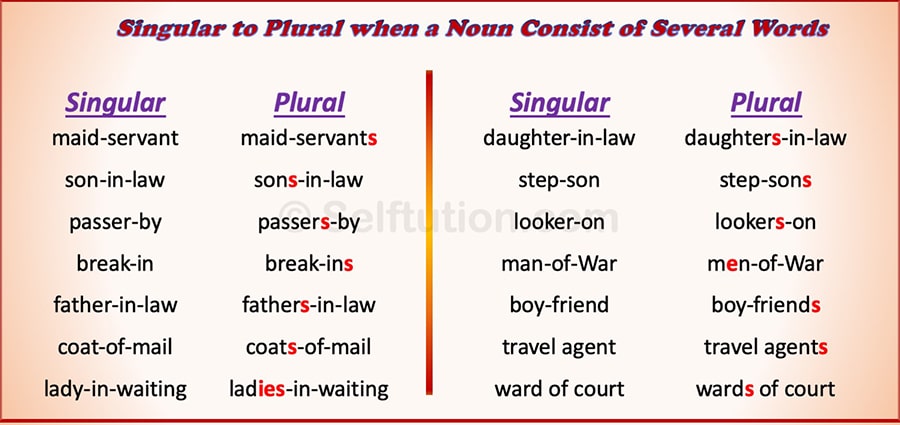
Examples of changing compound nouns to plural
We can also change singular nouns to plural by replacing the last letter or letters of the word with ‘ves’ or ‘ies’. Rules for changing singular nouns to plural by replacing the last letter or letters of the word are as follows:
Rule 5: Replacing ‘f’ or ‘fe’ with ‘ves’
To change most of the singular nouns ending with ‘f’ or ‘fe’ to plural, we replace them with ‘ves’. However, as an exception, some singular nouns ending in ‘f’ form their plural in the normal way, that is by the addition of ‘s’ at the end.
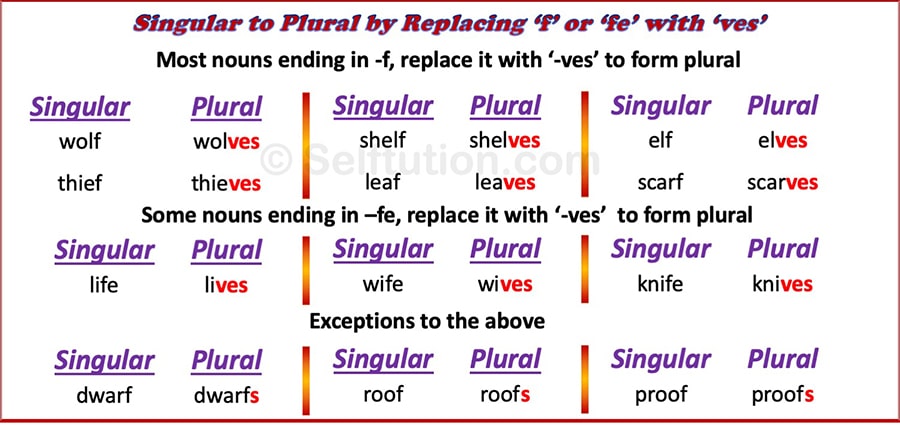
Examples of changing Singular Nouns to plural by replacing ‘f’ or ‘fe’ at the end with ‘ves’
Rule 6: Changing Singular Nouns ending with ‘y’ to Plural
Singular nouns ending in ‘y’, preceded by a consonant, form their plural by replacing it with ‘ies’. However, singular nouns ending in ‘y’, preceded by a vowel, form their plural by the addition of ‘s’ at the end.
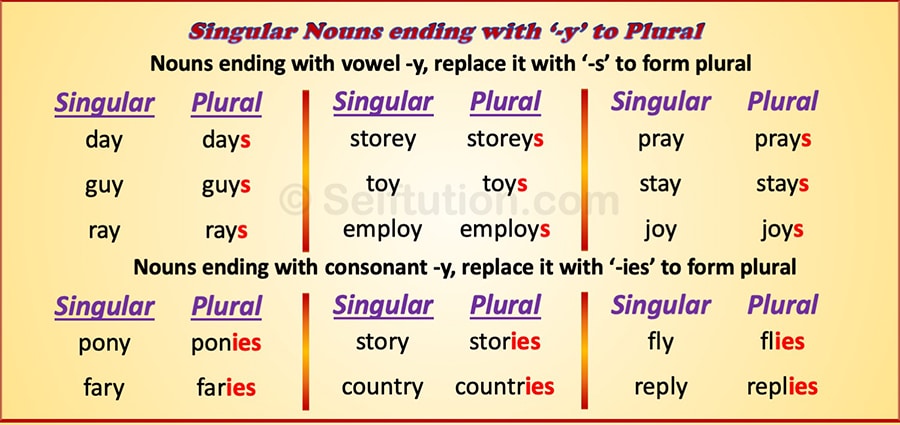
Examples of Singular to Plural Nouns by replacing ‘consonant y’ and ‘vowel y’ with ‘ies’ or ‘s’
Rule 7: Replacing inside vowels or vowels
A few nouns form their plural by changing inside vowel or vowels.
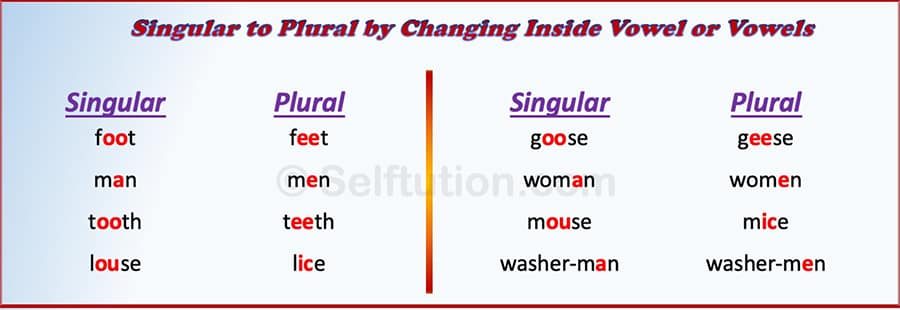
Examples of Singular to Plural Nouns by replacing the inside vowel or vowels
Apart from the addition or the replacement of letters in a word, there are some special rules for changing singular nouns to plural.
Rule-8: Alike Singular and Plural
Some nouns have the singular and the plural alike.
Examples of singular and plural nouns are swine, sheep, deer, dozen, hundred, thousand, score, fish, pair, species, aircraft, spacecraft, and fruit.
Singular – We need a dozen mangoes. Plural – We need three dozen mangoes.
Singular – This cloth cost me a thousand rupees. Plural – This cloth costs me five thousand rupees.
In the case of fish and fruits, we also use fishes and fruits. Fish and fruit suggest a single variety. Fishes and fruits suggest a different variety.
Example,
It is good to eat fruit every day.
A variety of fruits are available in the market.
Rule 9: Some Nouns are always used in the Plural
Some nouns like scissors, trousers, spectacles, jeans, pajamas, binoculars, pliers, shorts, tongs, and bellows suggest two essential parts, therefore always used in the plural.
Examples,
My spectacles need to be changed.
His clothes are dirty.
Some other examples of nouns that are always used in the plural are arms, particulars, riches, savings, stairs, valuables, and outskirts.
Rule 10: Some Collective Nouns that appear Singular but are used as a Plural
Certain collective nouns like cattle, poultry, gentry, vermin, family, team, jury, and people have the appearance of a singular noun. But they are used as a plural.
Examples,
The cattle are grazing on the ground.
The people were not impressed.
Rule 11: Nouns that appear Plural but are used as Singular.
Some nouns ending with ‘ics’, like mathematics, politics, physics, ethics, and acoustics, look to be plural, but they are used as singular.
Examples,
He is good at politics.
Mathematics is an exact science.
Words plural in form but singular in meaning include news, innings:
The news is good.
India won by an innings and four runs.
certain diseases: mumps, rickets, shingles
certain games: billiards, darts, dominoes, bowls
Rule 12: Changing figures and letters to plural
We change figures and letters to plural by adding an apostrophe and ‘-s’.
For example,
Add two 4’s to three 5’s.
You don’t spell yours d’s well.
Rule 13: Singular Abstract Nouns to Plural
Rules applied for changing abstract singular nouns to plural depend on whether it is countable or not. Uncountable abstract nouns do not have a plural form. For example, love, anger, honesty, advice, experience, beauty, fear, courage, death, hope, horror, knowledge, mercy, help, pity, relief, suspicion, and work.
Whereas countable abstract nouns have a plural form. For example,
victory – victories,
decision – decisions,
failure – failures
Rules-14: Singular Materials or Substances Nouns to Plural
Similar to rule 14, rules applied for changing singular material nouns to a plural depend on whether it is countable or not. Uncountable material or substance nouns do not have a plural form. For example, jam, oil, gin, sand, water, wine, cream, gold, ice, and silver.
Sometimes, the same word can be countable as well as uncountable depending on its usage. Therefore, if the usage of words suggests it as a countable noun, then we can change it to plural by the addition of ‘-s’ at its end. For example, the usage of the word ‘stone‘.
This house is made of stone.
In this sentence, the word stone has been used as the name of the building material. So, it is uncountable. But, we can say –
The boy is throwing stones in the pond.
Here, the word stones means pieces of stone.
Rules-15: Some Nouns are always used as Singular
Some nouns like baggage, damage, luggage, furniture, shopping, camping, parking, and weather are always used in the plural.
You may also like…... Types of Chemical Reactions in Chemistry

